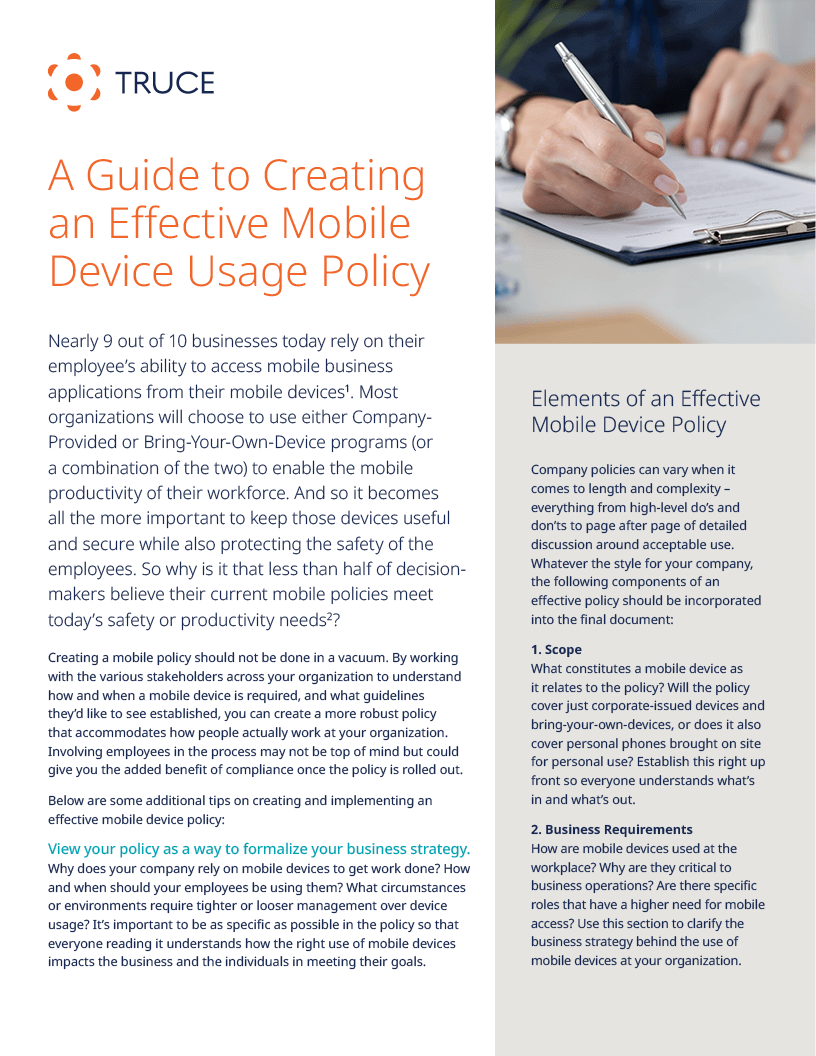Three key takeaways:
- Deploying mobile devices can have a positive or negative impact on a company’s reputation
- For optimal effect, a mobile device policy must be comprehensive and clear
- Using mobile devices can help an organization recruit and retain employees
For any organization hoping to avoid exactly that, a comprehensive, modern approach to mobile device usage is a must-have. And for businesses that employ deskless workers, it’s especially important to understand all the ways that mobile devices can bolster or harm the reputation of both the company and the employees who use them. For now, let’s take a closer look at the top five:
Employee Experience
Mobile devices have the capacity to help workers feel more connected to the office – and to one another – while empowering them with a tool to improve their productivity. In fact, iPass claims that the average mobile worker puts in 240 hours more per year than the general population. Rather than filling out manual reports and keeping track of the paper trail, employees can access work orders, project plans, proposals, invoices and other work resources directly from their devices. In a competitive job market, a smart mobile device approach can even help a company win over new hires and increase retention rates.
Employee Retention
It stands to reason that happy workers are less likely to leave a company. Equipping employees with a robust suite of technologies and tools demonstrates an investment in their success. For many employees, technology has trophy value. Knowing that they’re working with cutting-edge technology related to their field can be a draw similar to a benefits package. Investment in these types of full-featured tools is also suggestive to a workforce that management wants to enable their professional development. And, for all these reasons, full-featured technology tools can help increase employee productivity, engagement and longevity.
By equipping employees with the added convenience of being able to work from a mobile device in the field, a business can create a day-to-day work environment that supports the productivity and happiness of its employees – and thus become more competitive all around. A smart mobile device approach can enhance the recruitment of employees who are more efficient than their paper- and desk-based counterparts.
Customer Satisfaction
In today’s marketplace, mobile device technology is no longer viewed as progressive – but essential. It can improve not only internal communications but also connections with B2B and B2C clients. Project updates are instant, and organizations can be more agile with real-time information. This means, for example, a technician can check on the availability of a part without having to call someone else. Providing real-time access to inventory data further empowers the technician in this instance.
Additionally, customers like to be able to receive and pay an invoice immediately after the work is done. Waiting for backend accounting teams to email an invoice or – worse – mailing a bill is a dissatisfying customer experience in today’s digital age. The ability to instantly communicate with satisfied, well-informed deskless employees makes customers happy, leading to better reviews and more referrals.
Customer Perception
Mobile device usage can have both a positive and negative effect on customer perception. It all depends on how and when it is being used. If a customer sees a worker using a smartphone or similar device and believes it’s being used for personal reasons, they may question the employee’s professionalism or commitment. Employees who appear to be focused on something other than their customers or their work can lead to dissatisfaction with the employee and by association, the company they work for. Much of this, though, comes down to expectations: In some occupations – for example, a server taking a food or drink order on a tablet – customer perception can actually be positive.
Distracted Driving
There is no quicker way to harm a company’s reputation than for its employees to use mobile devices while driving in company vehicles. Twenty-six percent of all car accidents involve a mobile device – but even being seen using a mobile device while driving a branded fleet vehicle can damage the reputation of a business. The cost isn’t limited to a company’s image alone: Nuclear Verdicts, which awards penalties to victims of distracted driving accidents, can drive negative press, slowly siphon resources due to increased insurance rates and potentially bankrupt an organization.
Mobile devices can be good for business, the recruitment and retention of employees and a company’s reputation. But the effects may not always be positive. It’s important to put in place a robust mobile policy to discourage misuse and account for some of the negatives discussed above. The benefits of mobile device usage outweigh the risks, but only if strong, clear policies are enacted and enforced.

A Guide to Creating an Effective Mobile Device Usage Policy
Learn the components of an effective policy

